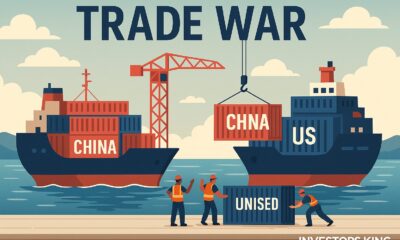Government
It Has To be Hillary Clinton – Enquirer
Published
9 years agoon

Presidential elections should be about who’s the best candidate, not who’s the least flawed. Unfortunately, that’s not the case this year.
Republican Donald Trump and Democrat Hillary Clinton, the most unpopular pair of presidential candidates in American history, both have troubled relationships with truth and transparency. Trump, despite all of his bluster about wanting to “make America great again,” has exploited and expanded our internal divisions. Clinton’s arrogance and unwillingness to admit wrongdoing have made her a divisive and distrusted figure as well.
The Enquirer has supported Republicans for president for almost a century – a tradition this editorial board doesn’t take lightly. But this is not a traditional race, and these are not traditional times. Our country needs calm, thoughtful leadership to deal with the challenges we face at home and abroad. We need a leader who will bring out the best in all Americans, not the worst.
That’s why there is only one choice when we elect a president in November: Hillary Clinton.
Enquirer editor: Why we’re endorsing for president
Clinton is a known commodity with a proven track record of governing. As senator of New York, she earned respect in Congress by working across the aisle and crafting bills with conservative lawmakers. She helped 9/11 first responders get the care they needed after suffering health effects from their time at Ground Zero, and helped expand health care and family leave for military families. Clinton has spent more than 40 years fighting for women’s and children’s rights. As first lady, she unsuccessfully fought for universal health care but helped to create the Children’s Health Insurance Program that provides health care to more than 8 million kids today. She has been a proponent of closing the gender wage gap and has stood up for LGBT rights domestically and internationally, including advocating for marriage equality.
Trump is a clear and present danger to our country. He has no history of governance that should engender any confidence from voters. Trump has no foreign policy experience, and the fact that he doesn’t recognize it – instead insisting that, “I know more about ISIS than the generals do” – is even more troubling. His wild threats to blow Iranian ships out of the water if they make rude gestures at U.S. ships is just the type of reckless, cowboy diplomacy Americans should fear from a Trump presidency. Clinton has been criticized as being hawkish but has shown a measured approach to the world’s problems. Do we really want someone in charge of our military and nuclear codes who has an impulse control problem? The fact that so many top military and national security officials are not supporting Trump speaks volumes.
Clinton, meanwhile, was a competent secretary of state, with far stronger diplomatic skills than she gets credit for. Yes, mistakes were made in Benghazi, and it was tragic that four Americans lost their lives in the 2012 terror attacks on the U.S. consulate there. But the incident was never the diabolical conspiracy that Republicans wanted us to believe, and Clinton was absolved of blame after lengthy investigations. As the nation’s top diplomat, Clinton was well-traveled, visiting numerous countries and restoring U.S. influence internationally. She was part of President Barack Obama’s inner circle when the decision was made to go after and kill Osama bin Laden and negotiated U.N. sanctions that led to the Iran nuclear deal.
Her presidential campaign has been an inclusive one, reflected by the diversity of her supporters. She has even moved to the left on health care, expressing a willingness to consider Sen. Bernie Sanders’ single-payer “Medicare for all” health care plan. Clinton has talked about building bridges, not walls, and has a plan to keep immigrant families together with a path to citizenship.
We have our issues with Clinton. Her reluctance to acknowledge her poor judgment in using a private email server and mishandling classified information is troubling. So is her lack of transparency. We were critical of her 275-day streak without a press conference, which just ended this month. And she should have removed herself from or restructured the Clinton Foundation after allegations arose that foreign entities were trading monetary donations for political influence and special access.
But our reservations about Clinton pale in comparison to our fears about Trump.
This editorial board has been consistent in its criticism of his policies and temperament beginning with the Republican primary. We’ve condemned his childish insults; offensive remarks to women, Hispanics and African-Americans; and the way he has played on many Americans’ fears and prejudices to further himself politically. Trump brands himself as an outsider untainted by special interests, but we see a man utterly corrupted by self-interest. His narcissistic bid for the presidency is more about making himself great than America. Trump tears our country and many of its people down with his words so that he can build himself up. What else are we left to believe about a man who tells the American public that he alone can fix what ails us?
While Clinton has been relentlessly challenged about her honesty, Trump was the primary propagator of arguably the biggest lie of the past eight years: that Obama wasn’t born in the United States. Trump has played fast and loose with the support of white supremacist groups. He has praised some of our country’s most dangerous enemies – see Vladimir Putin, Kim Jong Un and Saddam Hussein – while insulting a sitting president, our military generals, a Gold Star family and prisoners of war like Sen. John McCain. Of late, Trump has toned down his divisive rhetoric, sticking to carefully constructed scripts and teleprompters. But going two weeks without saying something misogynistic, racist or xenophobic is hardly a qualification for the most important job in the world. Why should anyone believe that a Trump presidency would look markedly different from his offensive, erratic, stance-shifting presidential campaign?
Some believe Trump’s business acumen would make him the better choice to move America’s slow recovery into a full stride. It’s true that he has created jobs, but he also has sent many overseas and left a trail of unpaid contractors in his wake. His refusal to release his tax returns draws into question both Trump’s true income and whether he is paying his fair share of taxes. Even if you consider Trump a successful businessman, running a government is not the same as being the CEO of a company. The United States cannot file bankruptcy to avoid paying its debts.
Trump’s rise through a crowded Republican primary field as well as Sanders’ impressive challenge on the Democratic side make clear that the American people yearn for a change in our current state of politics. However, our country needs to seek thoughtful change, not just change for the sake of change. Four years is plenty of time to do enough damage that it could take America years to recover from, if at all.
In these uncertain times, America needs a brave leader, not bravado. Real solutions, not paper-thin promises. A clear eye toward the future, not a cynical appeal to the good old days.
Hillary Clinton has her faults, certainly, but she has spent a lifetime working to improve the lives of Americans both inside and outside of Washington. It’s time to elect the first female U.S. president – not because she’s a woman, but because she’s hands-down the most qualified choice.
Is the CEO and Founder of Investors King Limited. He is a seasoned foreign exchange research analyst and a published author on Yahoo Finance, Business Insider, Nasdaq, Entrepreneur.com, Investorplace, and other prominent platforms. With over two decades of experience in global financial markets, Olukoya is well-recognized in the industry.

You may like
-


Beijing Strikes Back: US Goods Face 125% Tariff Starting April 12
-


China Hits U.S. Goods with 84% Duty Amid Deepening Trade Dispute
-


Pharma Stocks Fall Sharply as Trump’s Tariff Threat Sparks Sector-Wide Selloff
-


White House Confirms 104% Tariff on China to Begin April 9
-


US-China Trade Talks Falter as Beijing Signals ‘Fight to the End’
-


Goldman Sachs Warns of U.S. Recession Risk Rising to 45% Amid New Tariffs



